Introduction
What To Feed Cockatiels: Cockatiels, with their vibrant personalities and striking crests, are among the most popular pet birds worldwide. These small parrots, native to Australia, have captured the hearts of bird enthusiasts and pet owners for decades. To ensure your feathered friend’s health, happiness, and longevity, it’s crucial to provide them with a well-balanced and nutritious diet. The dietary requirements, preferences, and best practices for nourishing these charming avian companions.
Whether you’re a new cockatiel owner or seeking to enhance your existing bird’s diet, this guide will help you make informed choices to promote your cockatiel’s well-being and vitality. So, let’s delve into the world of cockatiels and nutrition and discover the key elements of a proper diet for these delightful birds. Cockatiels, often called “miniature cockatoos,” are known for their intelligence, social nature, and ability to form strong bonds with their human caretakers. These qualities make them cherished members of many households, demanding special attention to their dietary needs.
In this guide, we will explore the essential components of a cockatiel’s diet, including the types of foods they should consume, the importance of variety, and the occasional treats they can enjoy. Understanding what to feed your cockatiel is crucial for their physical health and plays a significant role in their emotional well-being. By providing your cockatiel with the proper nutrition, you can ensure they live a long, vibrant, and joyful life as part of your family.
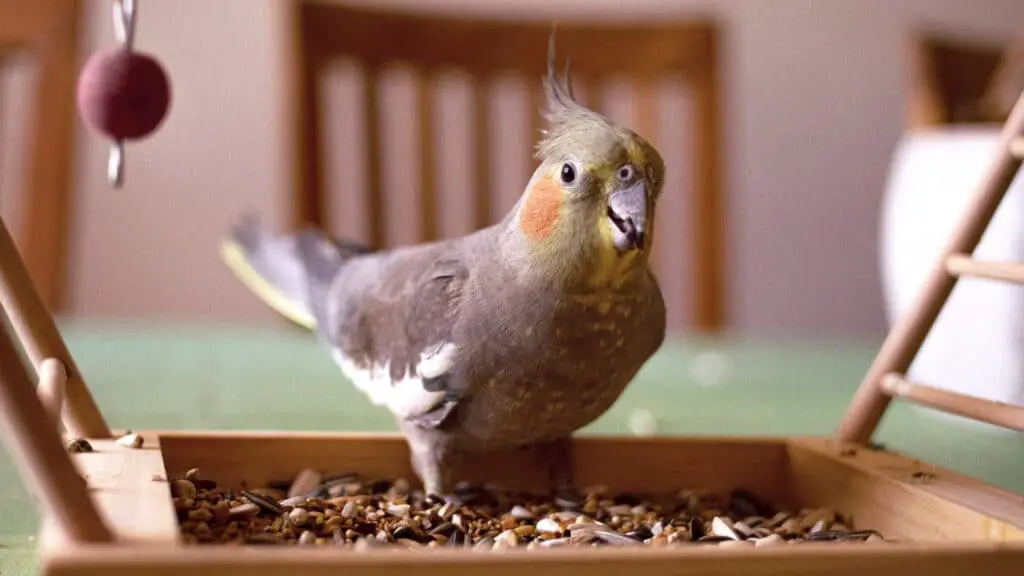
Can cockatiels eat rice?
Yes, boiled rice is ok to give to cockatiels. However, if possible, you should prefer to provide them with brown rice rather than white. White rice has far fewer nutrients and does not benefit your bird significantly. Always ensure only to give rice in moderation because it is a high-carb food product.
Cockatiels can eat cooked rice, such as white or brown rice, as long as it is plain and free from additives like salt, butter, or spices. It’s essential to cook the rice thoroughly and ensure it’s soft and easily digestible.
Rice should be considered an occasional treat rather than a primary component of your cockatiel’s diet. While rice provides carbohydrates, it lacks some essential nutrients crucial for your bird’s overall health. It should be offered in moderation alongside their diet of pellets, fresh fruits, and vegetables.
Cockatiels thrive on a diverse diet. While rice can be a part of their occasional treatment rotation, it should not replace their primary sources of nutrition. Offering a variety of foods ensures they receive a balanced diet with essential vitamins and minerals.
How much should I feed my cockatiel?
The amount needed for a mature cockatiel of seed or pellets will generally be 1.5 to 2 level Tablespoons (30 – 40 grams) a day. Some owners often like to provide lunch for their Cockatiels. This is fine as long as the total amount fed per day isn’t exceeded. In the wild, Cockatiels eat in the morning and early evening.
Many cockatiel owners opt for high-quality commercial pellets as the primary source of nutrition. These pellets are formulated to provide a well-balanced diet, so follow the manufacturer’s recommendations on the packaging for the daily serving size. Typically, this will be around 1-2 tablespoons of pellets per day per cockatiel.
In addition to pellets, offer your cockatiel fresh vegetables and fruits daily. A small serving (approximately the size of your cockatiel’s head) of mixed veggies and fruits is usually sufficient. Ensure that you provide a variety to meet their nutritional needs. Examples include leafy greens, carrots, bell peppers, apples, and berries.
Seeds should be considered a treat rather than a primary food source because they are high in fat and can lead to obesity if overconsumed. Limit seeds and other treats to no more than 10-15% of your cockatiel’s daily diet. Offer them sparingly, such as a teaspoonful, a few times a week.
Do cockatiels eat fruits or veggies?
Fruits, vegetables and greens should account for no more than 20-25% of the daily diet. Pale vegetables, with a high water composition (i.e., iceberg or head lettuce, celery), offer very little nutritional value. Avocado is potentially toxic and should never be offered to a bird.
Fruits such as apples, pears, bananas, and berries are not only delicious to cockatiels but also provide essential vitamins like vitamin C and various antioxidants. They also offer natural sugars for energy.
Vegetables like leafy greens (e.g., spinach, kale), carrots, bell peppers, broccoli, and sweet potatoes are rich in vitamins A, K, and various B vitamins. They also provide dietary fiber, which aids in digestion.
Offering a diverse range of fruits and vegetables introduces variety into your cockatiel’s diet, preventing dietary monotony and boredom. This can stimulate their interest in food and provide mental enrichment.
Is milk OK for cockatiels?
Cockatiels are lactose intolerant and feeding them milk can cause problems with their digestive system and can be painful and even fatal. They can also show symptoms of milk allergies which can result in vomiting and even death.
Cockatiels, like most birds, are lactose intolerant. They lack the necessary enzymes to digest lactose, the sugar found in milk. Consuming lactose can lead to digestive upset, including diarrhea and abdominal discomfort.
Milk is not a natural or essential component of a cockatiel’s diet. It does not provide the necessary nutrients, vitamins, or minerals that these birds require to thrive. Instead, it is high in fat and can lead to obesity if consumed excessively.
Cockatiels obtain most of their hydration from water, and milk does not replace or supplement this need. Offering milk instead of water can lead to dehydration, which is harmful to their health.
Can cockatiels eat bananas?
Yes, cockatiels can eat bananas as a treat. But it’s important to remember fresh fruits should only be given to pet birds in moderation as a supplement to a balanced diet.
Bananas are a good source of essential vitamins and minerals, including vitamin C, vitamin B6, potassium, and dietary fiber. The natural sugars in bananas provide a quick energy boost for your cockatiel.
While bananas are nutritious, they are also relatively high in sugar. Therefore, it’s essential to offer them as an occasional treat rather than a daily staple. A small portion of banana, such as a bite-sized piece or a thin slice, is sufficient for a cockatiel. This helps prevent overconsumption of sugar.
Make sure the banana you offer is ripe but not overripe. Overripe bananas can be too mushy and messy for your bird to handle. Peel the banana and cut it into appropriately sized pieces for your cockatiel to eat comfortably.
Can cockatiels eat egg?
Eggs are full of protein and calcium and definitely a good choice for cockatiels in moderation. However, it might take time for your cockatiel to start eating a new food item. Offer eggs in a shallow dish with plenty of fresh water. If they still don’t eat it, you might have to resort to feeding them supplements.
Offer eggs cooked rather than raw. Cooking eliminates the risk of potential salmonella contamination. Scrambled eggs or hard-boiled eggs are safe and easy-to-prepare options for your cockatiel. Avoid using butter or oil when cooking eggs for your bird. Stick to plain, unseasoned eggs.
Eggs should be considered an occasional treat rather than a daily staple of your cockatiel’s diet. A small portion, such as a teaspoonful of scrambled eggs or a small piece of hard-boiled egg, is sufficient as a treat. Feeding eggs too frequently can lead to an unbalanced diet, so use them sparingly.
As with any new food, observe your cockatiel’s reaction to eggs. While allergies are rare, some birds may have sensitivities to certain foods. If you notice any adverse reactions, discontinue offering eggs.
Can cockatiels eat tomatoes?
Cockatiels can eat raw tomatoes if they are not underripe or rotten. Raw tomatoes should be washed first to remove any pesticide residues that may be present. Next, cut them up into small pieces before feeding them to the bird.
Tomatoes are a good source of vitamins and minerals, including vitamin C, vitamin K, folate, potassium, and dietary fiber. They also contain antioxidants, such as lycopene, which can have health benefits.
While tomatoes offer nutritional benefits, they are also acidic and can be high in water content. Therefore, it’s essential to provide them with in moderation. Small, bite-sized pieces or thin slices of tomato are suitable for your cockatiel.
Before giving tomatoes to your cockatiel, remove the seeds and peel the skin. Tomato seeds can contain trace amounts of natural toxins, and the skin can be tricky and challenging for your bird to digest.
Can cockatiels eat coconut?
Thankfully, cockatiels can enjoy a wide variety of foods, which includes fresh coconut. These adorable birds love the taste of coconut and enjoy its derivatives like coconut oil, coconut water, and coconut flesh.
Yes, cockatiels can eat coconut in moderation, and many birds enjoy this tropical treat. Coconut provides several nutritional benefits and can be a healthy addition to your cockatiel’s diet when offered correctly.
As with any new food, observe your cockatiel’s reaction to coconut. While allergies are rare, some birds may have sensitivities to certain foods. If you notice any adverse reactions, discontinue offering coconut.
Coconut is a good source of healthy fats, dietary fiber, and various vitamins and minerals, including potassium and iron. It contains medium-chain triglycerides (MCTs), which can provide a quick source of energy.
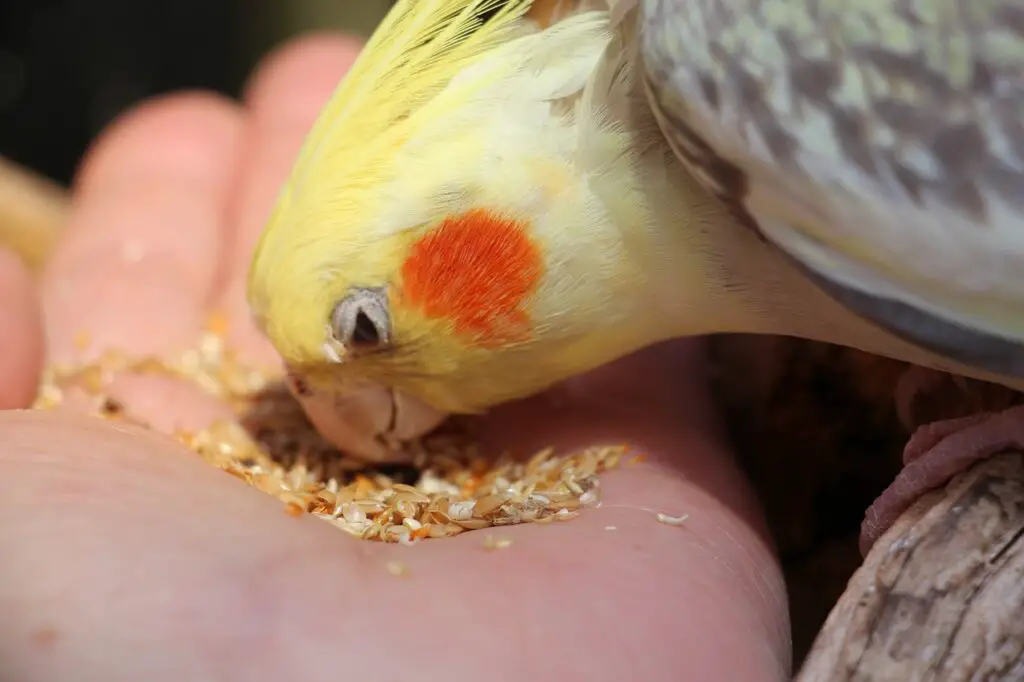
Conclusion
Understanding what to feed your cockatiel is an essential aspect of responsible pet ownership. Delved into the intricacies of providing these captivating birds with the right nutrition to ensure their health, happiness, and longevity. Cockatiels, with their charismatic personalities and remarkable bonds with their human caretakers, deserve the best care possible. By offering a well-balanced diet that includes high-quality pellets, fresh fruits, and vegetables, you can meet their nutritional needs and promote their overall well-being. Variety in their diet is key, providing mental stimulation and preventing dietary monotony. Additionally, ensuring they have access to clean, fresh water is fundamental to their health.
While it’s tempting to offer occasional treats, it’s crucial to do so in moderation to prevent potential health issues. Your cockatiels’ food health should always be the top priority. In summary, by following the guidelines outlined in this guide, you can provide your cockatiel with the nourishment they need to thrive. Remember that a well-fed cockatiel is not only a healthier bird but also a happier and more interactive companion. So, continue to explore, learn, and adapt to your bird’s preferences, and you’ll enjoy many years of companionship and joy with your beloved cockatiel.

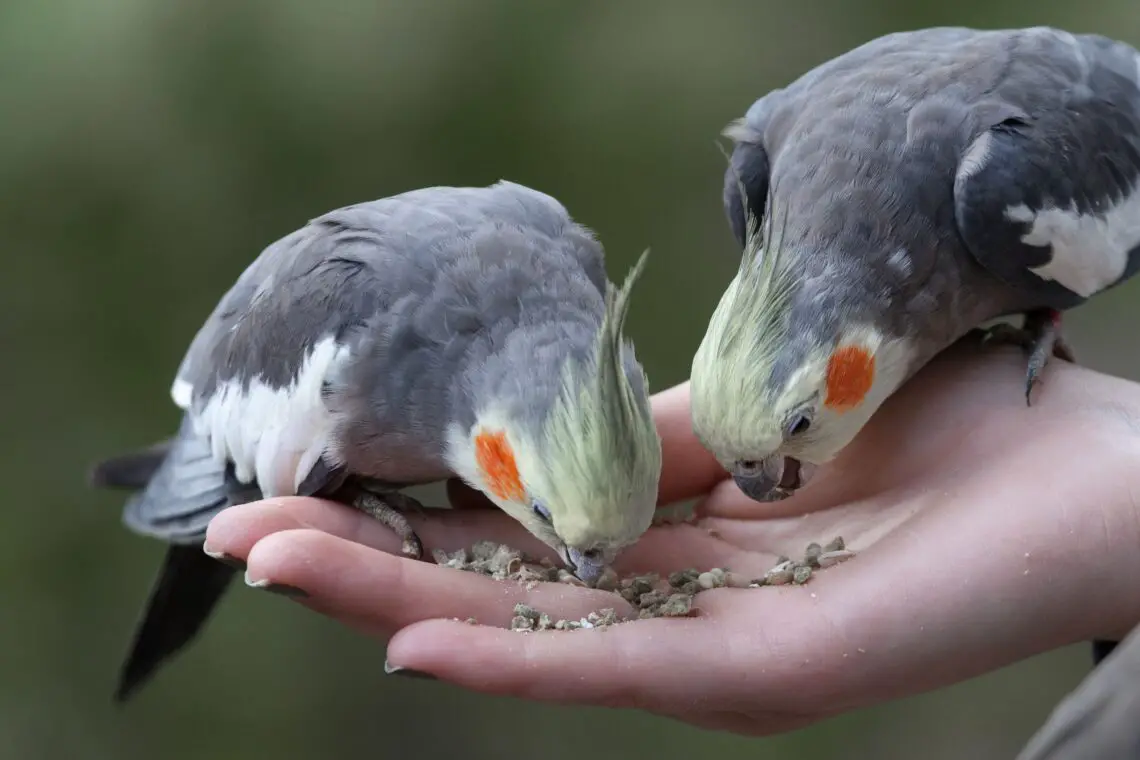
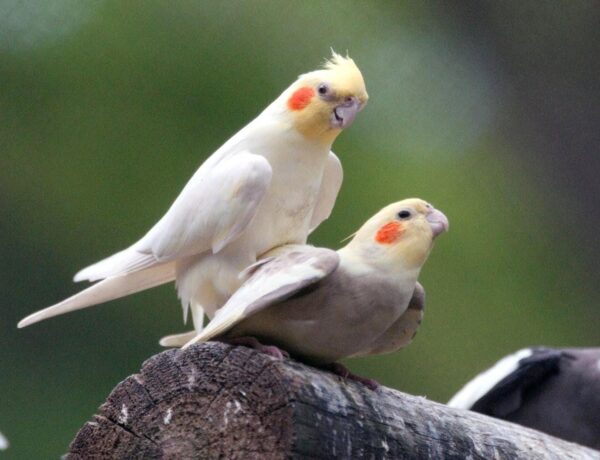
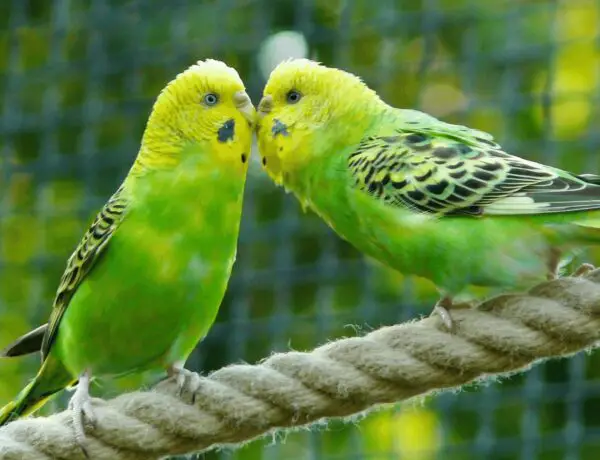
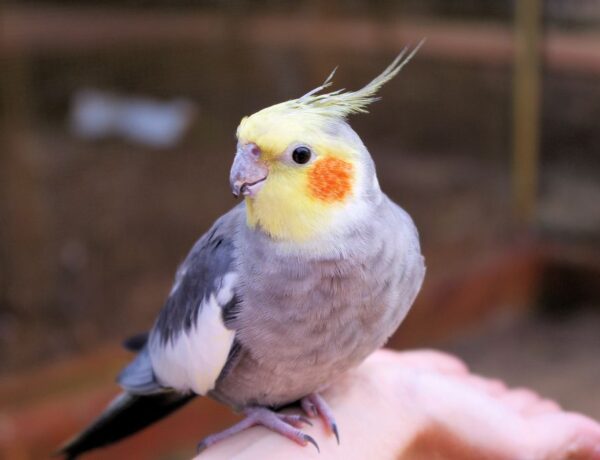
No Comments